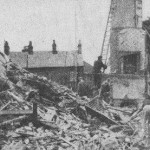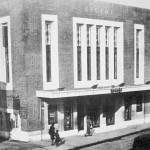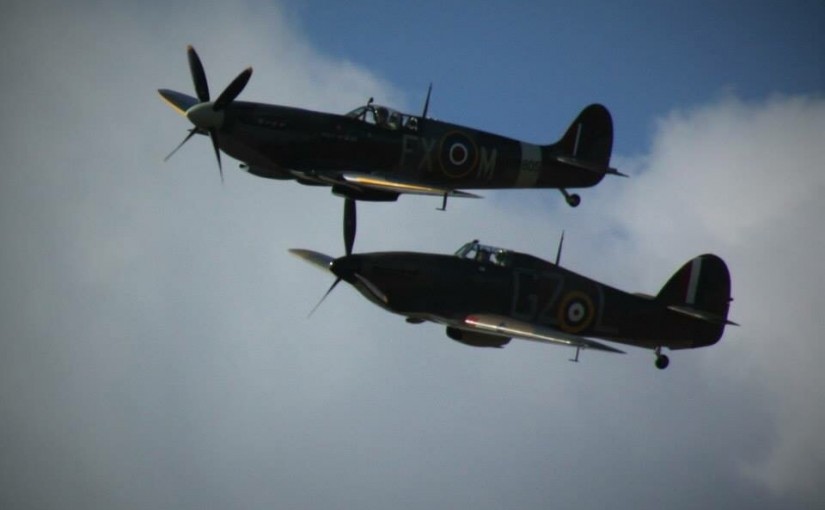Even the Kitchen Sink was Involved
The phrase “all but the kitchen sink” did not hold out when the Germans smashed Havelock Villas on the Strand for, large as life, there was the kitchen sink sitting on the top of one of the houses of “T square”. As it and the other contents of Havelock were blasted out, my dad working in his work shop, heard and saw a piece of rock drop through his roof and finish by his foot. The whole roof had to be replaced after the War.

When Rye was declared a front line, I did some duty with the RAMC in their advanced dressing station in Watchbell Street and recall two or three incidents first hand.
One evening, Dr Button was there when the sound of a Spitfire, out of control, sounded over Camber Castle fields, The doctor and I rushed down to the lookout at the end of Watchbell Street, just in time to see its last spin into the ground and bury itself out of sight. The ambulance was almost on the spot but was unable to help and neither man nor machine were seen until a few years ago when it was all uncovered and identified.
There several of us helping the RAMC Corporal in Watchbell Street and two of whom kept awake in shifts at night. On this night the Corporal and I were doing our two hour shift awake, when all of a sudden, we heard outside the back door, a swish and then another. My mate said “fire-bombs – grab a gas mask” and he (very gently) opened the back door and with a smile said “pears”; the fruit was dropping from a pear tree and making a swish as they slid through the leaves.
Bomb Causalities Turned on Downed Pilot
One of the pilots who bombed Rye, crashed and was brought to our dressing station. When other patients discovered who he was they were clambering out of bed with an idea of killing him – so he had to be moved to Rye Hospital where he died of his injuries.
Rye was now in the front line. All elderly and unneeded people were advised to leave. It had been a night of raids and as I stumbled amongst the debris on my way home, old Mrs Kirby was standing at her open door, surrounded by wreckage and said to me as I went by “No bloody Nazi is going to turn me out of my home” and they did not for she was still there to the last all clear; a very brave lady.
Building Fault Revealed in Cinema after Bombing

When I first saw the wreckage of the Regent Cinema, I had a bigger shock than most because I saw the result of a fault I had seen whilst building. I was a quiet lad and had no say in policies but this one had worried me for years but I told myself it was a fault that might cause danger in future years. No one thought that the Germans one day would bring it to light. Two steel uprights sitting on concrete pads with holes in which to grout in bolts through the flanges; When it came time to fix the uprights the holes were not in the right places. We sent for the general foreman who came and considered it did not matter “Forget the bolts, stand the supports and carry on building” this we did. When, after the bombing, I saw these steel uprights leaning at about 60 degrees it frightened me because they would only be held by loose rubble.
After some thought I decided that as one person had died and two more had been uncovered from the wreckage on the public pavement, still alive, we must not let anyone else get injured so it was my duty to tell them. I told the demolition team to be careful, take the rubble away and if you see the uprights moving – RUN! Was that not a war and peace story and all in Rye?
A Shout from the Strand
One very dark night, I was going off duty from Watchbell Street and as I went into the Strand I heard someone shouting for help from the river. I shouted back that I was coming and with that he left off shouting; I had to ask him to continue making some sort of noise because it was so dark I would not find him; I kept following the noise and found the man on the deck of a small boat. The water was fairly low but slowly rising. He was lying face down and groaning. There was no easy way of getting him up but the tide kept bringing him nearer. As soon as our fingers met we were able to just grip each other and with lots of stretching and grunting he managed to pull on the top of the quay side.
He said he had spent the evening drinking in the Ship Hotel. He explained that when he came out he felt along gingerly with his feet and when they touched the coping of the quayside he thought he had to got a pavement and strode off but his foot stepped over the edge and down towards the river. The small boat moored there saved him going in the river. Now he was getting worried about being late back to camp so I told him I would go back with him and explain to the officers. He said they were in the Drill Hall, so as I could find myself about Rye, however dark, we were soon in Mill Lane; of course the blackout curtains were up but we could hear voices in the Drill Hall and because of the blackout we were let in very quickly. I explained our story and my rescued soldier was sent to his quarters and no action was taken. Now this is another war and peace story with no one being hurt and all taken place in Rye.
One day my old mate Arthur Luck and I were biking along the Winchelsea Road on our way to Crutches Farm where we were building a bridge to connect two fields together. Out of a peaceful day came four anti-aircraft gun bursts from a team of anti aircraft gunners that had set up their gun during the night. I think the fighter aircraft were better for dealing with enemy bombers than these ground guns. A piece of war.
Now we reach a main bridge over the same waterway over which we are putting another bridge. This was over-grown with brambles, then in a flash, down came a dart like dazzle of colour, with a closer look we saw it was a Kingfisher. We don’t very often see this but a family of such were about here for several years and maybe still are. Nice peaceful scene. Now we went through the gate to our job and what do we see, a definite sign of war. A shell hole just inside the gate. Our first thoughts were (unexploded bomb) so we got trestles poles and planks, calculated the slope and barricaded where we thought the bomb would be lying and asked for a bomb disposal team. We had calculated wrong and this gave the team a good laugh. Nevertheless, they recovered the danger went off leaving it safe. Another part of war now at last, to carry on with our peace job.
One afternoon, as we walked up to the farm yard suddenly Tha! Tha! Tha! of a machine gun with the bullets coming towards us. They were from a German hedge hopper. There was a little plantation of cricket bat willow with a dung heap close by. We dived behind it and my mate complained about the mess and smell. “A little of that is better than a lot of blood” I said, he agreed and most of the bullets went into the trees so making them no more use for cricket bats (unless someone made the game different) so the bats could have holes in them. A good mixture of war and peace.
It’s amazing how soon wartime enemies become friends. I remember talking to a prisoner of war after I was released, he came from Vienna and he asked me to teach him about democracy because he did not want to live under Hitler’s regime. We spoke at lunchtime whilst sitting on a log. He got into trouble for going off instead of staying with the rest of the prisoners of war because he taught people how to play the violin. Adams and Jarrett came to mend the hop picking machine and the man who came was a German. I found it strange to be working with a German engineer but we got on very well. He spoke good English but I couldn’t speak German. I thought it was amazing that two people who had bombing each other could get along so well.
As well as selling apples for the market we also sold damaged apples to the Merrydown Brewery to make cider. My father worked at the cider works at Horam Manor, near Heathfield, Sussex. He started his working life as a brick maker but there wasn’t enough work for him so he went to Horam Manor. My father had a set to with the owner of Horam Manor.
At that time, the railway decided to run a line between Polegate and Heathfield. There was an argument between the companies as to who would build the railway (the Cuckoo Line). The people who lived in that part of the country thought that they were direct descendants of the Saxons. My father belived he was a Saxon. He was fanatical about Saxons – he named his house after a Saxon hero.
On Easter Monday we biked through Brightling and Dallington to my aunt’s house. We passed the Fullers Arms. We had our annual dinner at the Fullers Arms once.
The apples that went to the cider maker were spoilt because the wind had blown them off the trees into a trench next to a building that was being built.
When my grandfather was making bricks he was at North Corner Brickyard. He was a champion brick-maker and when my grandfather found that I was laying them he said “Ill keep making them and you keep laying them.” My grandfather could make 100 bricks a day and I could lay 100 bricks. He made wire cut bricks that were cut with a cheese wire. They had no frog (the dent in the top of the brick). Wire cut bricks were cheaper because they did not need a mould.
I went to my grandfather’s house one day and he was toasting cheese on an open fire. He gave me some on the toasting fork.
When the weather was bad and my father couldn’t make bricks, he went to work in the garden at Horam Manor.
When I was a child I used to wonder whether the Saxon defence faced both ways – out to sea and into land. I found that the Saxons were given Sussex by the Normans so Sussex is really Saxony.
They had big guns to shoot outland and arrow slits in buildings that faced inland so that they could shoot through them.
We never found out why a triangular piece of brickwork was put between two buttresses. They had to be prepared as they had potential enemies on the land border as well as from the sea.
The Saxons were around Horam Manor and my father came from Horam. When he moved to Rye he brought his love of the Saxons with him.
On the 13 June, an expedition is mounting Ben Nevis and they have asked me to report on their journey of our true Saxons who will be part of the crowd. Mrs Caister, who was born in Rye, has asked me to write the report.
Rye’s Own July 2015
All articles, photographs, films and drawings on this web site are World Copyright Protected. No reproduction for publication without prior arrangement. (Hard Copy Back Numbers Still Available) © World Copyright 2016
